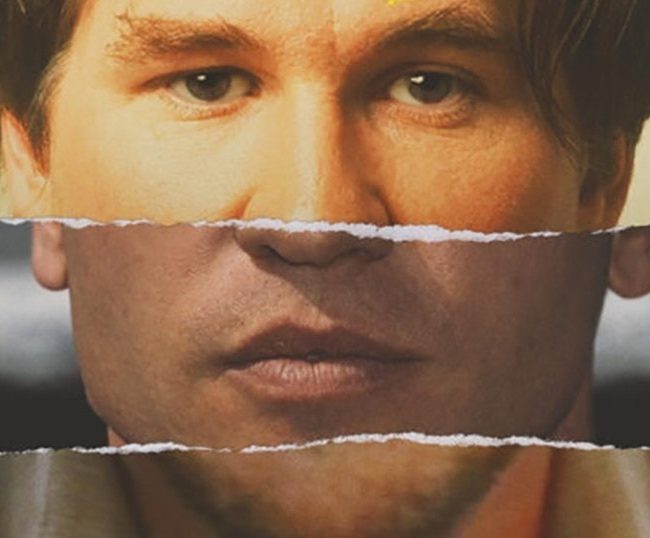Just so you guys have no excuses, we’re doing two months at once this time around.
***ISSUE #9: JUNE/JULY ‘10***
Red Without Blue (2007) — This moving and fascinating film is the documentary feature début of Brooke Sebold, Benita Sills and Todd Sills. The directors spent three years with identical twin brothers, Mark and Alex Farley. The boys had both come out as gay in their early teens, but the heart of the film is how they come to terms with Alex’s decision to transition from male to female, becoming Mark’s sister, Clair. What’s most beautiful about this story is the unbreakable bond between the twins and their united front when talking about their past, particularly their relationships with their mother, Jennie, a woman who experiences her own transitions during the course of the film. Like transgender director Kim Reed’s portrayal of her life growing up in Montana in Prodigal Sons, the Farleys had what appeared to be a quintessential American small-town upbringing. But by the time they had reached adolescence, the family was suffering through divorce and the fallout from a joint suicide attempt that precipitated a forced separation of the boys for two and half years. Told with much sensitivity and a strong cinematic voice by the directors, this is a hidden gem that should definitely be re-discovered. (Pamela Cohn) ***STREAM IT***
Fugazi: Instrument (2001) — Few other music docs could even begin to hold a candle against Jem Cohen’s Fugazi: Instrument. Cohen is a long time friend and artistic collaborator with the legendary D.C. punk band (he provided photography and other artwork to some of the band’s albums). Instrument is an outgrowth of their relationship, culling together Super 8, 16mm, and video footage from their travels together. As innovative and formally exploratory as the band’s music, Instrument pushes the relationship between sound and image, forgoing clichéd notions of synchronicity and seeking a deeper, more tonally based synthesis. (Cullen Gallagher)
Crumb (1994) — Art can save lives. That is the most urgent notion one gracefully stumbles upon when reflecting on the life of R Crumb. Born in Philadelphia to a career military man and his amphetamine popping wife, the widely influential illustrator’s entire career has unfolded on the outskirts of the mainstream comics industry, in places like Cleveland, San Francisco and the South of France. No one can deny that the legendary artist is an iconoclast, LSD user, chronic masturbator, genius—especially those that have seen Terry Zwigoff’s stunningly penetrating look at this troubled, deeply perceptive and engagingly witty man, which is coming out this summer in a richly deserved Criterion edition. One of the gold standard’s of 1990s American documentary filmmaking (and the director’s last foray in documentary), the new edition includes the typical assortment of enticing extras one would expect, including fifty minutes of discarded footage, an essay on the film by longtime Chicago Reader film critic Jonathan Rosenbaum and a commentary track featuring Roger Ebert and Zwigoff. (Brandon Harris)
Deep Water (2006) — Summer is the best season to sit in a dark, air-conditioned room and watch others struggle for survival against the natural elements via your DVD player. If this sounds about right to you, then Louise Osmond and Jerry Rothwell’s Deep Water is your ticket to summertime movie satisfaction: a thrilling documentary that marries physical and psychological suspense in a story that is just as much man vs. nature as man vs himself. In short: a brilliant engineer and outdoor adventurer named Donald Crowhurst entered a 1969 solo sailing race to circumnavigate the globe in a ship of his own invention. With money and career on the line, the stakes were already sky-high before Crowhurst set off on this wildly treacherous experiment. (Holly Herrick) ***STREAM IT***
Powder (1995) — While of all the pictures to try and champion this one at first glance or remembering might seem the most laughable, I beg open minds to think again. If only as a guilty pleasure if it must be anything, this button-pusher from the same god-awful, wish you could forget them, family fable modern Faust/Christ/Rasputin school of stories that started as far back as Harvey, continued through Carpenter’s Starman, and brought us such refuse as Phenomenon, K-Pax, Sidekicks, City of Angels, and Forever Young, actually can brag a little more than the rest. If you can’t get off on the eccentricity of the casting, at least Sean Patrick Flannery as a bald, static electric, mystical albino on par with Bruno S. should spark your interest and respect hopefully. That is, if you can overlook the tabloid scandal surrounding the director Victor Salva’s previous exploits with children, and enjoy the good in anything, even in the face of a mostly disappointing world of work. (Evan Louison)
A Real Young Girl (1976) — This French coming of age tale is director Catherine Breillat at her best and most raw. Shot on grainy 16mm in 1976, A Real Young Girl is the story of an angsty boarding school teen coming back to her parent’s house in the country for one long summer. Former porn star Charlotte Alexandra plays the beautiful, pouty and terribly bored Alice, who cleans out her earwax with her fingers and slips her spoon into her panties before slurping her soup. Breillat’s first film is rough around the edges technically, but provides an uncensored peek into the fantasy life of a virginal teen, bored and on the brink of madness. We watch her find some very creative and often ridiculous ways of amusing herself, including a carnival ride where Alice sits next to a creepy dude that brings a horrific/hilarious twist to the “dick in a box” concept. (This scene can be YouTubed.) The film was banned in many countries and only released in theatres in 2000. In case this summer isn’t hot enough for you already… (Alexandra Roxo)
Into Great Silence (2005) —Two and a half hours of monks, doing monk stuff. Nothing more, nothing less. The result is a film that isn’t about a monastery, as director Philip Gröning so memorably put it, but is a monastery. The boldest experiment in film time and space in many a moon, and the freshest and yet the most mature documentary in an era in which documentaries are increasingly commodified and gussied-up to appeal to low attention spans. (Tom Russell) ***STREAM IT***
Cabin Fever 2: Spring Fever (2009) — I was slow to watch this because director Ti West really ran it down to me that the whole film was so hung up in corporate limbo with Lionsgate not knowing how to release it, so I assumed Ti’s vision was neutered. In fact, Ti still feels it was and he says he wishes he could have used an Allen Smithee credit. It may not be the film Ti envisioned, but boy, is this a handful! Super gross out imagery like a closeup of a penis oozing puss and blood, lots of projectile blood vomit, fingernail pulls, fire extinguisher head bashing, sex with virgin fat girls, self amputation, the list goes on. But what is actually really cool about the film is that though it’s in the retro ’80s prom night horror movie genre it’s actually really well grounded with some sharply acted and staged high school awkward/paranoid clumsy geek scenes. The moments between lead Noah Segan and his pretty but smart and classy love interest Alexi Wasser are so honest and believable that they tilt the whole balance of the film toward the hyper-real and yet the gross out violence is so over the top the movie then seems to exist in this actual nightmare space of neo-magic realism. It’s a meta-horror film and yet it’s not a spoof or a satire; it’s more than a homage and yet it is very much a comedy. I don t know what it is but it’s something utterly unique. It’s Takashi Miike meets John Landis via Herschell Gordon Lewis, or something like that. If you can deal with the blood and gore, Cabin Fever 2 is a solid, fun film. (Mike S. Ryan)
At Close Range (1986) — This is one of those unheralded mid-1980s gems that shows its age in many ways, but boasts performances so commanding by Sean Penn and Christopher Walken that its climactic showdown still packs a serious wallop. James Foley’s drama is based on a true story about a Pennsylvania criminal whose sons got caught up in the crossfire. They are played here by real life brothers Sean and Chris (whose role takes on a greater weight in light of his tragic early demise). Madonna contributed the song “Live to Tell” to the cause, which provides the film with its recurring theme. It ain’t perfect, but it’s still mandatory viewing due to the burning intensity Walken and Penn, who are at their very, very best here. (Michael Tully)












